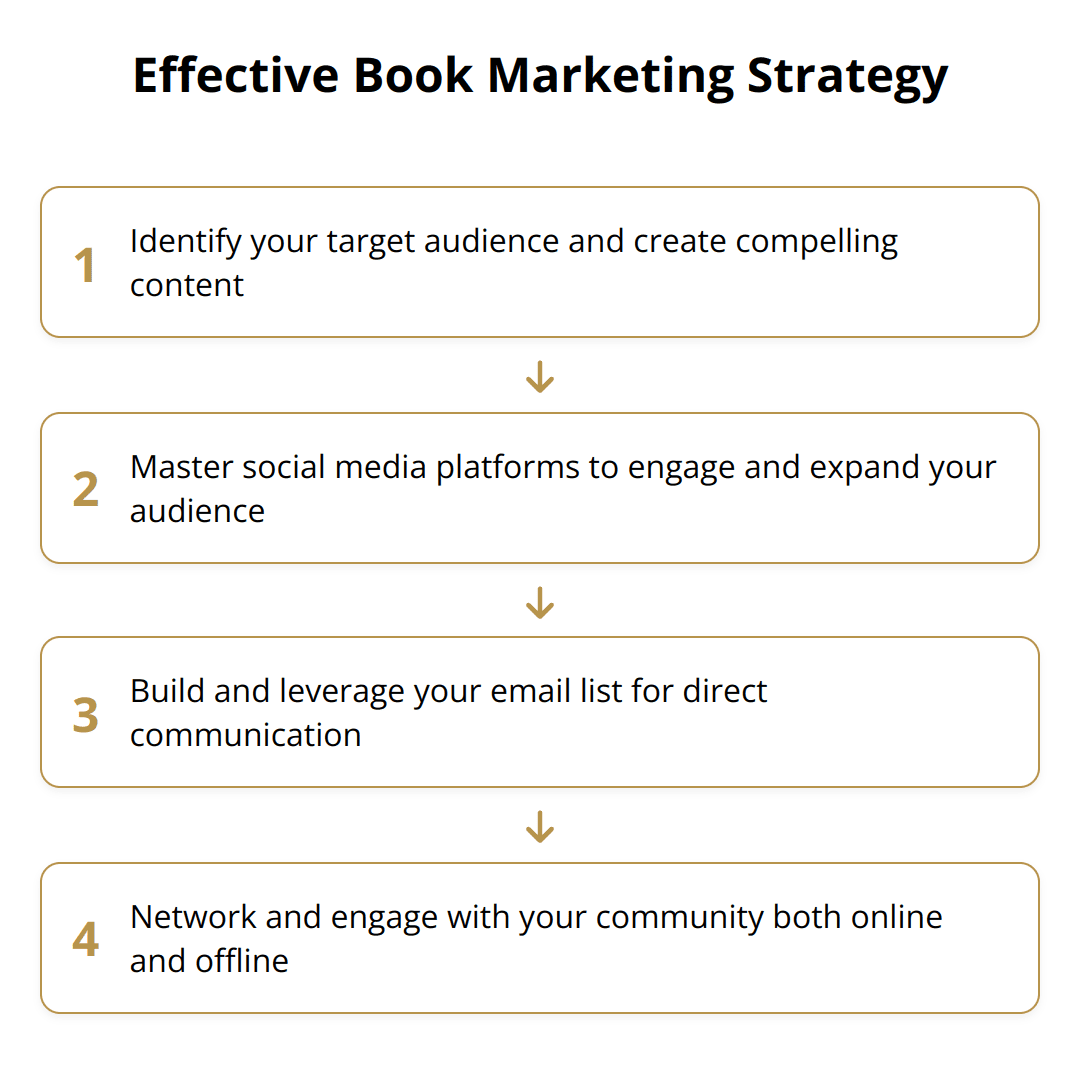At Beverly Hills Publishing, we understand the journey to publishing success is unique for every author. That’s why we’ve compiled a set of pro tips designed to guide you through crucial stages of self-publishing.
From honing your understanding of your audience to crafting a marketing strategy that resonates, this blog post aims to equip you with the tools for success. Let’s explore how to create a standout book and connect with your readers effectively.
Knowing Your Audience
To make your self-publishing journey a success, a deep understanding of who you’re writing for is essential. The process goes beyond just imagining an ideal reader—it involves thorough market research and a strategic approach to ensure your book meets the expectations and interests of your target audience.
Identify Your Target Readers
Start by defining your audience’s age range, interests, and reading habits. If you’re writing a young adult fantasy novel, your target audience might include teenagers who enjoy similar books like “Harry Potter” or “The Hunger Games”. For a self-help book focused on career advancement, your readers are likely professionals seeking practical advice to boost their careers.

Analyze Market Trends
Keeping an eye on current market trends within your genre is vital. Tools like Google Trends and Amazon’s Best Sellers lists provide real-time data on what’s capturing readers’ interests. If there’s a rising trend in post-apocalyptic fiction, and your book fits within this niche, you’re more likely to capture the attention of readers looking for their next favorite in that genre.
Tailor Your Marketing Strategy
Once you’ve identified your audience and analyzed current market trends, it’s time to craft a marketing strategy that speaks directly to your potential readers. This involves:
- Choosing the right platforms for promotion, such as Instagram for a younger demographic or LinkedIn for a professional audience.
- Creating content that resonates with your audience. Blog posts, social media updates, and email newsletters can provide value to your readers and build anticipation for your book release.
Additionally, engage with communities related to your book’s theme or genre. Reddit and Goodreads have various groups where authors can share their work and interact with potential readers.
- Adapt your advertising: Paid ads can be a powerful tool if used correctly. Facebook and Amazon ads allow for detailed targeting, ensuring your book reaches those most likely to be interested in it.

By applying these strategies with a clear focus on your target readers, you can significantly increase your book’s chances of success. Understanding your audience and market doesn’t just help tailor your writing—it ensures your marketing efforts hit the mark, making your self-publishing venture more rewarding.
A well-planned approach to identifying your readers, analyzing market trends, and tailoring your marketing strategy will not only help in creating a book that resonates but also in establishing a strong connection with your audience, ultimately leading to better sales and reader engagement.
Professional Presentation
After determining your audience and crafting a marketing strategy, turning your manuscript into a professional product is the next step. High-quality content, professional cover design, and appropriate formatting are not negotiable elements; they are the foundation of your book’s success.
Quality Content and Editing
The first impression of your book comes from its content. It’s imperative to invest in thorough editing. A book riddled with errors can damage your credibility and reader satisfaction. Consider hiring professional editors to review your manuscript. These professionals can dramatically improve your work, ensuring clarity, coherence, and readability. Editing ranges from developmental (big picture) to copy editing (grammar and syntax) and each stage plays a critical role in refining your manuscript.
Professional editors not only correct errors but can also offer suggestions to improve the overall flow and structure of your book. Don’t skimp on this step. The investment in quality editing is reflected in the final product, which can lead to increased reader satisfaction and more positive reviews.

Cover Design
Never underestimate the power of a professionally designed book cover. It’s the first thing potential readers see and it can make or break their decision to explore your book further. A professional designer will know how to translate your book’s essence into a visually appealing and genre-appropriate cover. Remember, your cover is a key marketing tool. It should stand out on bookshelves and online listings alike.
A compelling cover balances color, typography, and imagery to grab attention and convey the book’s mood. For example, bold, bright colors and simple, impactful fonts can work well for self-help and business books, while detailed illustrations might suit fantasy novels.

Formatting Matters
Formatting your book for various platforms is a technical but crucial step. Different platforms and formats (e.g., print, e-book, audiobook) have specific requirements. Poorly formatted books can be difficult to read and may be rejected by publishing platforms.
Ensure your book is formatted correctly for each distribution channel you plan to use. This might mean hiring a professional formatter or using formatting software. The goal is to provide a seamless reading experience across all devices and formats, from e-readers to printed copies.
To summarize, transforming your manuscript into a professional product involves meticulous attention to editing, investing in a professional cover design, and ensuring proper formatting. These elements significantly contribute to your book’s success, influencing how your audience perceives your work and ultimately decides to engage with it. Remember, publishing is not just about writing a book; it’s about presenting your story in the best possible way to your readers.
For more insights into the world of book publishing and marketing, explore book marketing trends and publishing trends.
Effective Book Marketing
Marketing your book effectively is more than just spreading the word; it’s about creating a strategy that engages your audience, leverages your strengths, and optimizes your resources for maximum impact. With the right approach, you can turn your book into a must-read and grow your reader base.
Mastering Social Media
Social media is not just a platform for sharing; it’s a powerful tool for engagement. Choosing the right platforms is key. For visual appeal, Instagram and Pinterest are unbeatable. Twitter is excellent for quick updates and building community through conversations. Facebook offers broad reach and the ability to create interest-based groups.
- Be Consistent: Post regularly but prioritize quality over quantity.
- Engage: Respond to comments, participate in discussions, and join groups.
- Share Value: Beyond your book, share content that enriches your audience’s lives.
Building and Leveraging Your Email List
An email list is a direct line to your most interested readers. It’s more than just a list; it’s a community waiting to hear from you.
- Start by offering something of value in exchange for email sign-ups. This could be a free chapter, an exclusive guide, or tips related to your book’s theme.
- Use your email list to share updates, behind-the-scenes content, and special offers. Keep your emails engaging and reader-focused.
- Personalization goes a long way. Use your readers’ names and segment your list based on interests for more targeted communication.
Networking and Community Engagement
Your fellow authors and industry professionals are invaluable resources. Collaborating with them can amplify your reach. Attend book fairs, workshops, and other industry events. Engaging with your local and online writing communities can offer new opportunities for promotion.
Community events like book signings, readings, and author talks are not just promotional opportunities; they’re chances to connect with your readers and gain insights into what they love.
- Offer to guest blog or participate in interviews to reach new audiences.
- Consider forming partnerships with authors in similar genres to cross-promote each other’s work.

By focusing on these strategies, you’re not just selling a book; you’re building a brand and a community of loyal readers. Marketing is an ongoing process, and success comes from consistent, authentic engagement with your audience. With dedication and smart strategies, your book can reach and resonate with more readers than you ever imagined.
For practical insights into navigating the complex world of publishing, explore our resources on publishing services and success stories.
Wrapping Up
The journey to self-publishing success is demanding but deeply rewarding. Along the way, authors learn not only about the art and craft of writing but also about marketing, audience engagement, and the dynamic nature of the publishing industry. What sets successful authors apart is their ability to persevere through challenges, continuously learn from their experiences, and adapt to the ever-evolving market demands.
![Key Takeaways - Self-Publishing Success Tips [Pro Tips]](https://b3004418.smushcdn.com/3004418/wp-content/uploads/2024/04/Self_Publishing_Success_Tips__Pro_Tips__6_2024_04_14_07_10_20_694497_00_00.png?lossy=1&strip=1&webp=1)
Perseverance is key in the world of self-publishing. The process can be long and filled with obstacles, but the reward of seeing your book published and appreciated by readers is unparalleled. Keep pushing forward, refining your craft, and believing in the value of your work. Remember, every successful author was once a writer who didn’t give up.
Engaging with your audience goes beyond mere promotion. It’s about creating a lasting relationship built on genuine interest and respect for your readers. Keep the lines of communication open through social media, email, and community events. Listen to their feedback, understand their desires, and let that knowledge guide your writing and marketing efforts. Your audience is your greatest ally in the quest for self-publishing success.
Adaptability in your strategies is fundamental. The publishing world is constantly changing, with new trends emerging and reader preferences evolving. Stay informed about the market, experiment with different marketing tactics, and be willing to pivot your approach based on what works. Flexibility allows you to navigate changes more smoothly and seize opportunities that align with your goals.
At Beverly Hills Publishing, we are committed to helping authors navigate the complexities of publishing and marketing. Our integrated approach combines high-quality publishing with strategic branding and marketing, setting you on the path to becoming a leading authority in your field. Explore how we can help you elevate your visibility and emerge as an industry leader with a commanding media presence at Beverly Hills Publishing.
In summary, self-publishing success is achievable with perseverance, continuous engagement, and adaptability. By staying committed to your vision, actively connecting with your readers, and keeping your strategies flexible, you can navigate the self-publishing landscape with confidence and make a lasting impact with your work.















































































































































































































































